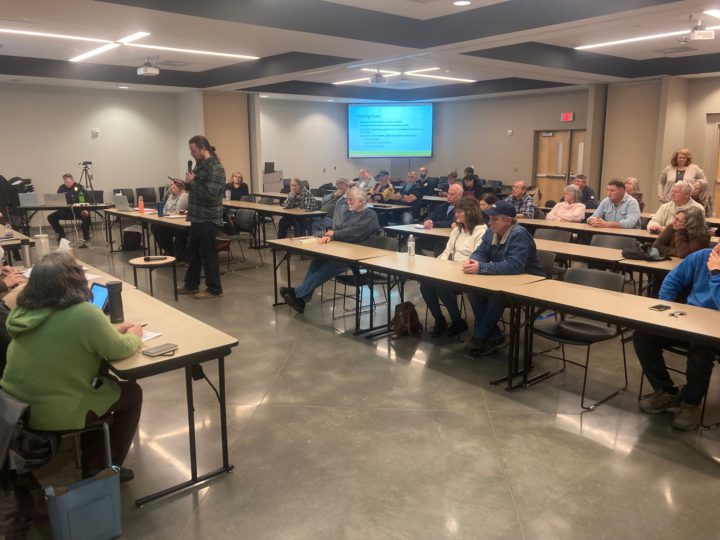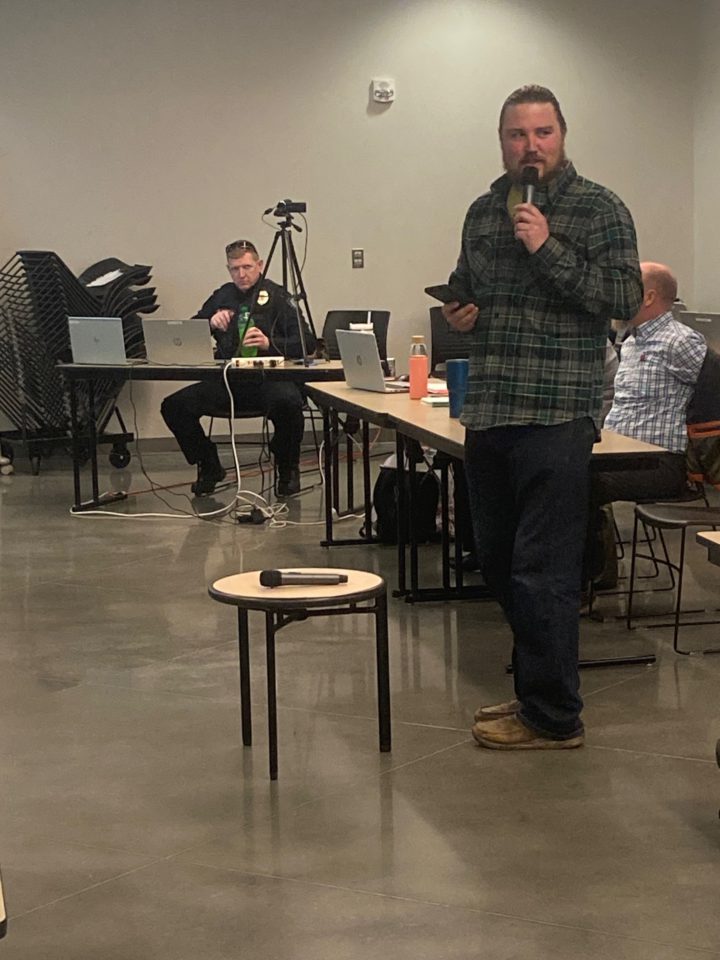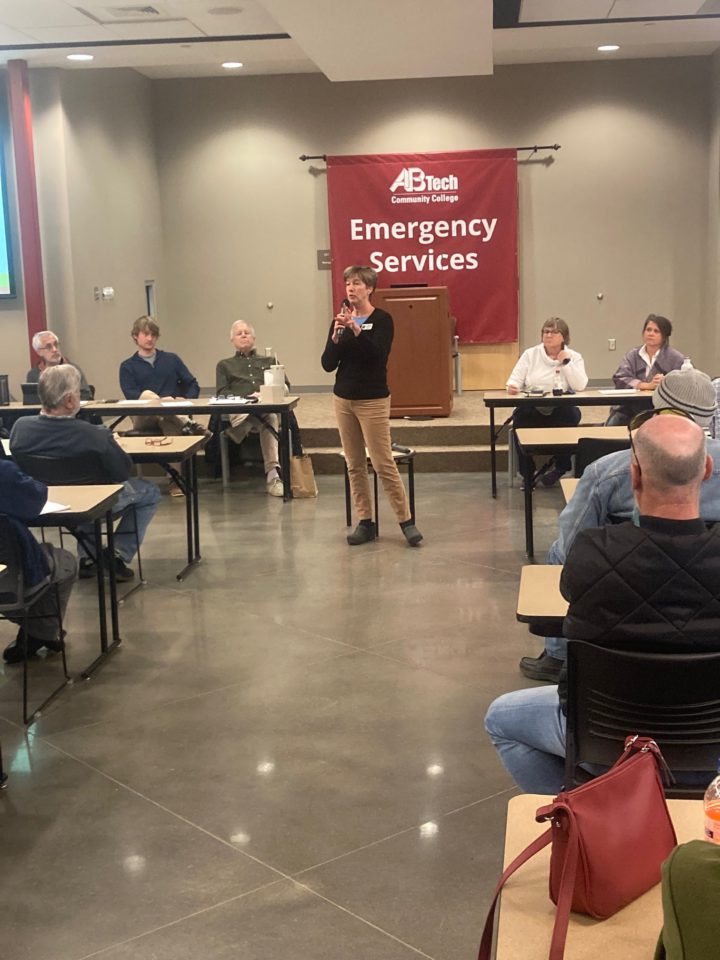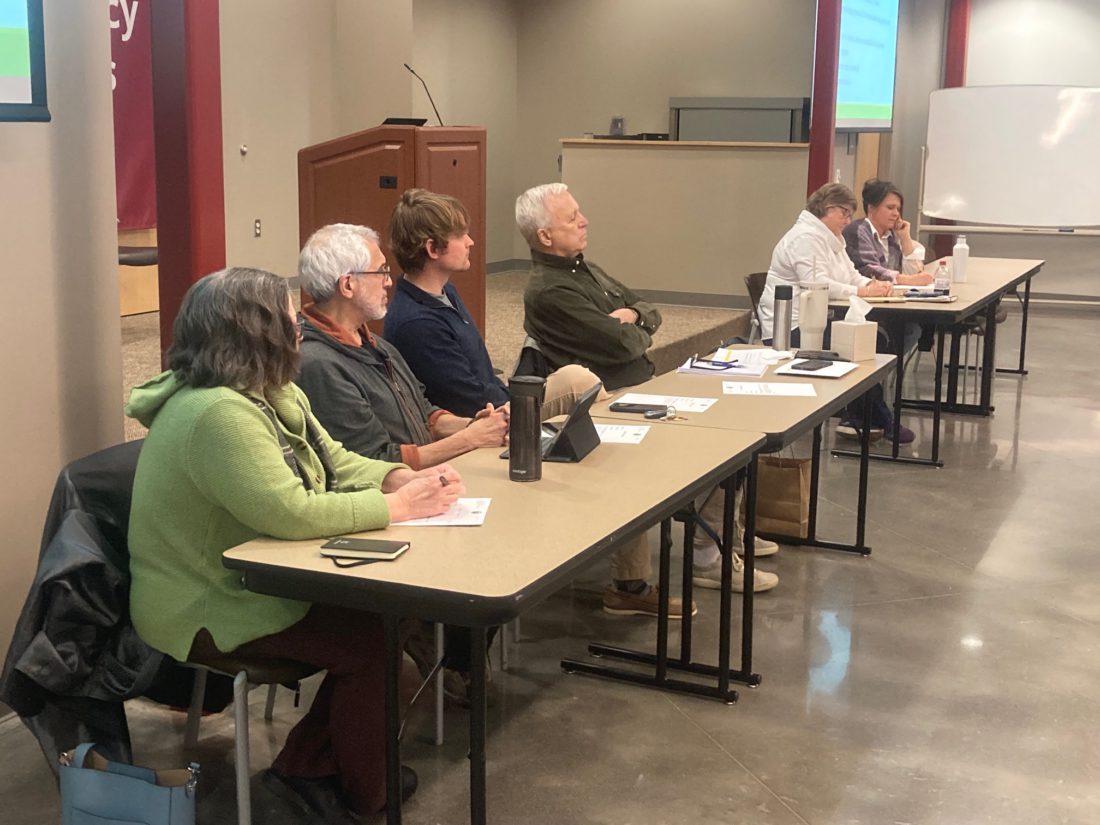Seventeen years after Woodfin annexed hundreds of parcels west of the French Broad River, some residents don’t want to be a part of the town. Many of them never did.
More than 30 residents who live on the west side of Woodfin showed up to send a message to Town Council on Feb. 1: “Let us go.”
“We’re not asking for any money. We’re just asking you to let us walk off into the sunset,” said Chip Parton, who circulated a petition to residents west of the river and helped organize the meeting with town leaders at the Buncombe County Training Center.
Woodfin Mayor Jim McAllister and five of the town’s six Council members heard resident after resident express almost two decades worth of pent-up frustrations with the town.
“It’s been 17 years, and I haven’t seen anything happening on that side of the river,” said resident Keith Freeman. “I paid right around $3,000 in taxes to the Town of Woodfin to get my trash picked up. That seems a little outrageous to me. If we got the services they get on the other side of the river, we’d be great. We probably wouldn’t be sitting here right now. But we don’t get those. And after 17 years, where is all that money that everybody in here has been paying in taxes? It’s not gone to the west side,” he said.
Parton has collected signatures of residents representing about 290 properties who want to leave the town. That’s about 55% of the area’s property owners, he estimates.

The neighborhoods of Rock Springs and Crest Mountain — part of the 2006 impetus for annexation of the western area of town — and Olivette Farms, a wealthier area in the northwest section of town that was annexed separately several years later, are not included in Parton’s petition area because there’s no interest in de-annexation there, he said.
Parton said more people would have shown up to the meeting, but many reported that they didn’t receive a letter from the town announcing the meeting. Others said they got it within a couple days of the meeting day and couldn’t make arrangements to attend on short notice. Parton noted that his letter was postmarked Jan. 24, a week before the meeting.
Town Manager Shannon Tuch told Xpress that the town mailed about 450 letters to the area that was annexed in 2006, excluding the gated Crest Mountain community, which requested to be excluded. Before the meeting, she said she didn’t know why letters may not have reached some residents, as they were sent out to all property owners.
“Nothing drives home feeling ignored like letters not reaching residents about a community meeting set up to address that very thing,” Parton said after the meeting.
How it started
The de-annexation movement sparked last summer, when the Town of Woodfin sent letters to all residents announcing a new stormwater fee that was part of a plan to keep the town’s state permit. Previous town administrators had ignored a violation issued in 2019 by the N.C. Department of Environmental Quality over the town’s negligence in maintaining its stormwater system. In response to that violation, the town levied fees to property owners based on the amount of impervious surface on a property to help pay for upgrades to the system.

But residents on the west side complained that there were no stormwater drains or infrastructure to speak of in their neighborhood, and they didn’t understand why they were suddenly asked to fork over more money to the town.
“If you listen to these people, we were left alone. And we’ve done our own thing. We were minding our business and we obeyed the law. For whatever reason … Woodfin took us in. And for 17 years we’ve pretty much ignored everything except [this stormwater fee]. And then that’s when you got the hornet’s nest stirred up,” said Max Parton Jr. “These people just want out.”
Most of the west side has no water or sewer service, instead utilizing private wells and septic systems, typical of a rural area. Without typical municipal infrastructure, several residents said they don’t understand why they should pay taxes to the town, which doesn’t operate any water or sewer lines. The Woodfin Water District, an independent entity and special taxing district whose lines don’t mirror town lines, manages water service for some Woodfin residents.
Metropolitan Sewerage District, another independent entity, handles sewer lines for parts of Woodfin and Asheville.
The town has its own Police Department, provides trash and recycling service, maintains stormwater infrastructure, maintains town streets and parks and has a Planning and Zoning Department.
Confusion over what services the town provides were prevalent throughout the meeting’s comments.
There’s also frustrations over road maintenance, including inadequate signage and poor salting in the winter on some roads west of the river, according to at least one resident. Many of the major roads in that area, however, are state roads and not maintained by the town.
Woodfin’s jurisdiction
Residents also had complaints over confusion and misinformation from previous town administrators over rules related to certain zoning regulations, requirements regarding livestock and permissions regarding manufactured homes on private property.
Woodfin does have control over town ordinances and some zoning regulations, Tuch said, adding that changes can be made to address those concerns.
Additionally, the town applied for federal grants to run water lines across the river but was denied funding, Tuch said. She said the town could look into other options for getting water and sewer west of the river.
“I feel very confident that we could land somewhere that you all would appreciate, that would be better than what you’ve experienced,” she said.
Many of the stories recounted by various residents had to do with previous town administrations, including one regarding repeated mixed messaging around how much land was required in order to keep goats. All Woodfin town council members are in their first term in office, McAllister was elected Mayor in 2023, and Tuch was hired in March 2022.
“Just because you were told ‘no’ in the past, ‘we can’t afford it’ in the past, or ‘we don’t want to do it’ in the past, none of that matters anymore. Give our town staff a second chance,” McAllister said. “Those people don’t work for your tax dollars anymore. So give us a chance.”
Amid the conversation, resident Mike Cogdill acknowledged that a listening session such as this one would never have happened under the town’s old leadership.

‘We just want out’
Still, the residents in the room kept coming back to their preferred solution, de-annexation.
At one point, state Sen. Julie Mayfield asked the room a hypothetical question. If the town came to you with solutions to all the infrastructure issues that had been discussed and fixed all these problems would you want to stay in the town and work with them or go?
It was a resounding, unanimous response. “We just want out,” they said.
“We hear you loud and clear. Clearer than we’ve ever heard you before,” McAllister said.
In order for part of a municipality to de-annex, it must come from the N.C. General Assembly, Mayfield said. In order for Mayfield or state Rep. Caleb Rudow, who was also at the meeting, to sponsor a de-annexation effort, cooperation from the town is vital, Mayfield said.
Mayfield also cautioned that there may be some unintended consequences of leaving the town that should be considered, including what type of zoning the county would apply to the de-annexed areas.
For the town itself, Tuch told Xpress before the meeting that de-annexation could have a significant impact on town coffers.
“The whole annexation area from 2006 represents approximately $245,000 in property tax revenue, or about 6.5% of the town’s total operating budget.”
The town’s budget is about $7.5 million this fiscal year, she added.
“Loss of revenue is not our main concern, though. We think there’s value in having an engaged community that works together to make things better for everyone. Giving certain residents the choice of opting out has the potential to erode the integrity of the community, lowering the cohesiveness and quality of life for everyone else.”
Mayfield said the soonest the N.C. General Assembly could consider the issue is in April, when it returns to session. She hoped the town and residents could come to an agreement on increased services or de-annexation of some of its neighborhoods before the conversation moves to Raleigh, if it gets there.
McAllister said the Council will discuss the topic at its upcoming retreat Wednesday, Feb. 7.
“I can only guarantee you one thing here tonight. It’s close to the very beginning of a lot of discussions. That won’t be the end. I can guarantee you that,” he said.




Woodfin is another example of the crazy conglomeration of municipalities and interwoven county property that abut Asheville’s also crazy and detrimentally restricted geographic boundaries. Most all of this is due to the water system history of Asheville coupled with the huge debt Asheville took on during the roaring 20’s and before the Great Depression.
Most newcomers think of Woodfin as a small area north of Beaver Lake; at least I did. Instead, it is quite sizable geographically and spreading from UNC Asheville to the south to the Old Marshall Highway to the north and from the west side of the French Broad River (where the challengers live) to Reynolds Mountain to the east.
Now here’s the crazy thing about Woodfin: Propery owers in this municipality pay a property tax rate of $0.3300/$1000 assessed. They also pay a $0.1059/$1000 assessed for the Woodfin Fire District (fire protection). Combined, those two tax rates ($0.4359) are GREATER than Ashevilles: .4030 ( if you’re lucky enough NOT to also live in the Asheville School District which has an additional tax of $0 .1062). As an important aside, this Asheville School District taxpayer abomination needs to be fixed sooner than later with a merger of this school system into Buncombe County Schools.
By any semblence of rationality, Woodfin shouldn’t even exist as a separate entity. It should be annexed into Asheville with two important results: 1) Assuming Woodfin was NOT included in the Asheville School District (reasonable assumption because currently Woodfin residents attend county schools), Woodfin residents would see a LOWER tax rate, and 2) Asheville would benefit by adding the much needed tax base bulk to make their operational overhead costs more cost effective.
Remember, each separate entity (Woodfin, Asheville, Buncome County, Biltmore Forest, etc.) have to fund their own administrative overhead as well as capital equipment for the services they provide. This amounts to lots of duplication and expenses for which the only benefit I can see is “perceived” greater local control.
The City of Asheville will only be a healthy/thriving entity if it can reasonably grow its tax base. And lest one thinks that merging with Asheville would result in crazy politics, it is only a matter of time before Asheville moves to a broader and more rational City Council makeup that includes district representation along with at-large. The current all at-large City Council is untenable and results in skewed policies that do not represent the entire city.
Your suggestions make sense and are pragmatic, but bury two rather important points: most of these rural residents would continue to see no benefit in traditional city services (and Asheville is neither accustomed to expanding services to new areas, nor inclined to cut its budget for luxuries like reparations to focus on infrastructure upgrades), and more importantly nobody trusts the government of Asheville, which is widely regarded as an authoritarian, unrepresentative laughingstock. Your assurance that someday it will be run correctly is… pretty weak.
Asheville has to get its act together first and figure out whether it’s a serious municipality or an undergraduate branch of the DSA.
A third point missing: Woodfin has finally righted course after years of mismanagement, lack of vision, laziness and lies, a drunken town manager, alleged legal malpractice, environmental neglect and many examples of apparent small-town corruption. The new town commission is comprised of an intelligent, experienced, balanced group of humans who listen (and respond) to taxpayers. They probably want little to do with the self-inflicted dysfunctional Asheville City Council–a group of tone-deaf ‘leaders’ who, time and again, fail to stand up to protect their own citizens: noise ordinances, law enforcement, unreasonable developments such as Robinhood and the Bluffs, quality of life, and on and on…but heck, maybe a few dozen overpriced consultancy studies will change some minds and prove me wrong.
Thanks for our comments.
I can’t disagree with the above feeling/perceptions of past and even present Asheville city government because I share them; however, looking at other large cities and counties across our state that seem to be operating well (like Winston-Salem for example), you discover that virtually all have a much larger city-to-county tax base ratio than Asheville to Buncombe County (e.g., larger geographical footprint for the city). That larger city geographic tax base is what all medium-to-large cities need to reach a sort of critical mass to fund the things all cities are faced with doing.
Asheville doesn’t have this critical mass and so it struggles to fulfill. Is it just funding? No, but I believe funding plays a much larger role than people understand.
Regarding the political dysfunction, clearly what needs to change is the elected makeup of City Council. I advocated strongly for a balance of district and at-large representation back in 2019 along with Councilmember Kapoor. Unfortunately, Mayor Manheimer and the city council did not support this, but to me, it is only a matter of time before this changes.
Were Woodfin to be annexed (voluntarily) into Asheville, I am certain a district representative structure would be part of the agreement; probably 2 from the North Asheville/Woodfin region.
As long as everyone in this area (including Buncombe County) continues to protect their “silos”, the overall area/region will suffer. Currently I am attempting to get the Buncombe County Commissioners on board with greater financial support of Asheville that is actually owed to Asheville taxpayers based on the county tax structure. So far, they are ignoring me.
But Mike, then all these displaced ‘leaders’ would have little to do except to become consultants!
M.R. you make some valid points but are you assuming county residents want to be part of the joy of Asheville?
MR you make some reasonable points but are you assuming Buncombe County residents want to be part of the joy called Asheville.
That’s one reason it will never happen. The legislature would also oppose it and their vote is needed.
Residents outside of Asheville do not owe Asheville. The forced annexation and taxation that Mike continues to suggest is not fair to anyone who chose not to reside in Asheville and be subjected to their overly aggressively expenditures and misguided belief of what Asheville was or is. Asheville needs to learn to act responsibly within its own budget and revenues without seeking tax revenues from thosenot under their ignominious reign.
1st, I am not advocating “forced” annexation. 2nd, if this was an “easy” process/insight, it would have been done long ago.
What I am trying to do is educate about one of the main reasons Asheville continues to fail. It’s not the only reason, the politics also have to change. But keeping the status quo (everyone protecting their silo), in my view, will hurt everyone in the long run.
To succeed, compromises will have to made by all parties including the state. For example, the structure of the BCTDA needs to change (more on that later). Asheville needs to agree to a more equitable (and reasonable) representation structure (at large and districts), the Asheville School System needs to merge into BCS, Buncombe County needs to recognize that withholding tax money that rightfully should be returned to Asheville (Sheriff county patrolling funds, County Fire Marshall, and Sales Tax distribution inequity), and finally, water customers in the county paying more for water service than Asheville customers (would require the state to repeal part of the Sullivan Act)
So, for example, if the region wants a well maintained civic center and performance auditorium, if all water users would like to have a water system that is reliable, if the region wants a greater sustained reduction in crime (all types) and traffic safety, among many other goals, then I would submit Asheville (the city) has to have a greater tax base. My point about Woodfin’s taxes being more than Asheville’s resulting in duplication of municipal overhead versus Asheville, I believe makes that point. And by the way, while Woodfin has it’s own water system and water source, Asheville Water backs that up with ties from our system. That backup does not charge nearly enough (wholesale) and is a give away in my opinion. Same is true for Biltmore Forest, but that is a whole ‘nother story.
It’s incredibly easy to carp at Asheville (I know so because I’ve done it alot and continue at times). But looking deeper into the history of this region, it sure appears to me that there are systemic issues that if not resolved, will only worsen over time (e.g., Buncombe County growth/development will far outpace Asheville’s simply because of available land).
Asheville continues to fail because its elected leaders have lost a clear path. They focus on every nonsensical farce rather than actually spending funds on reliable and sustainable infrastructure for the residents and budgeted versus their actual tax base. The continued suggestion of annexation just to support a flailing and wandering city government and their whimsical expenditures is an overreach.
I am not carping at Asheville, but it seems that suggestions to annex (forced or not) is not really a sustainable resolve here. Where does it stop? And, Woodfin’s water district is immensely better run than Asheville. Is that because they annexed others? I don’t know, but Asheville had the funds to execute a water system, but they have made errors in budget and development that lead them down this money grab that is being suggested.
Also, either stop whining about the Sullivan or openly and through governmental channels petition for its overturn to suit your needs. Stop thinking that writing lengthy missives in a small editorial paper is going to influence anything.
The ideas/concepts I am providing in my lengthy missives are to get citizens to perhaps see things in a different light and provide some historical context to our unique situation. I realize this will make some (perhaps many) angry as they may be fearful of change they think they don’t want or need.
Any change, is a long way off for now; however, I have a deep belief that this country is headed for a serious financial crisis. Should that occur sooner than later, a template for a more financially efficient and more regional governing model may well be urgently needed and sought after.
Self-obsessed nonsense. Good luck with that.
Maybe you could advocate for Asheville to secede from Buncombe County and run (or again fail to financially run) its own autonomous region?